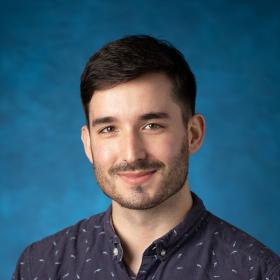



John González, a sixth-year PhD candidate in experimental pathology, aims to use the lessons he learned at Yale to demystify the relationship between aging and illness.
“The risk of being diagnosed with or debilitated by illnesses and chronic diseases consistently rises with age, but aging isn’t something we think about as a risk factor because we see it as unchangeable,” Gonzalez says. “But we know that something is happening at the biological and physiological level when we age that makes us more prone to disease, and I think figuring out what it is about aging that puts us at risk is a fruitful area of study for anyone who wants to prevent illness.”
In the paper González is currently working on, he examined specific genetic features of aging and argued that the research community could be overlooking the key to preventing disease.
“As some people age, certain genes go haywire, and those genetic changes predispose them to certain illnesses,” González says. “The focus of scientific research is on the genes that change because those are more likely to cause disease. But we also have genes that remain the same even as we age, and to me, that group is just as interesting. If we can figure out why these genes remain stable, it might help us find therapies that will help prevent change in the genes that cause disease with age.”
Connecting Scientific Silos
González began his studies at Yale with the Combined Program in the Biological and Biomedical Sciences (BBS), a one-year cross-disciplinary program that serves as the gateway into Yale’s degree-granting programs in the biosciences. The program empowered him to pursue passions across campus, granting him the interdisciplinary skills necessary for a career in pathology.
“Entering without a specific advisor or department enabled me to learn about so many different types of research happening across the university,” González says. “It’s very student-centered, so if you enter in pharmacology but want to rotate with a professor in immunology or structural biology, you can. If you know you want to work with one professor but learn a specific technique from another, you can. Now that I’m thinking about entering the job market, it is helpful that Yale has prepared me so well to work in different scientific settings and bridge gaps between silos.”
Advocating For Fellow Students
On top of his research work, González also serves as vice chair of the Graduate Student Assembly (GSA), an elected body of Yale students in the Graduate School of Arts and Sciences. Along with valuable leadership skills, the job has taught him more about the complexities of Yale’s graduate student experience.
“Often, my job is just demystifying the complexity that is graduate school,” González says. “Sometimes, I’ll be in meetings that are completely unrelated to my role in GSA, but I’ll be able to answer questions about the structure of the program or suggest new funding opportunities that people just might not have heard about. It’s been a great way to make sure all students have access to the amazing resources at Yale and hear about any changes that affect the graduate student experience.”
One such change was a recent increase in graduate student stipends, which González says has been vital for student well-being and professional development.
“Generous stipends allow us the financial stability to focus on our work without stressing about paying rent,” González says. “Yale’s higher stipends played a meaningful role in my decision to attend, and the entire community benefits when we are able to draw the best students here.”
Student-First Funding
In addition to facilitating cross-disciplinary study, Yale’s funding structures also allow students to pursue their passions without being restricted by a specific professor’s resources.
In the process of scientific research, professors may go through phases during which their work is particularly popular and they receive lots of funding, but they can also have phases where things are slower, González says.
“But graduate students shouldn’t be deterred from their research goals just because certain professors happen to be receiving fewer grants during the time that a student is on campus,” González says. “Yale makes sure that students are funded for their training before they join a professor’s lab and makes sure that no matter what is happening with their specific advisor, students receive a living wage for their work. It also gives professors highly trained students who will help them get the data they need to get that next grant. In a very direct way, Yale is investing in helping faculty get the resources they need to make sure their science is supported by outside funding.”
